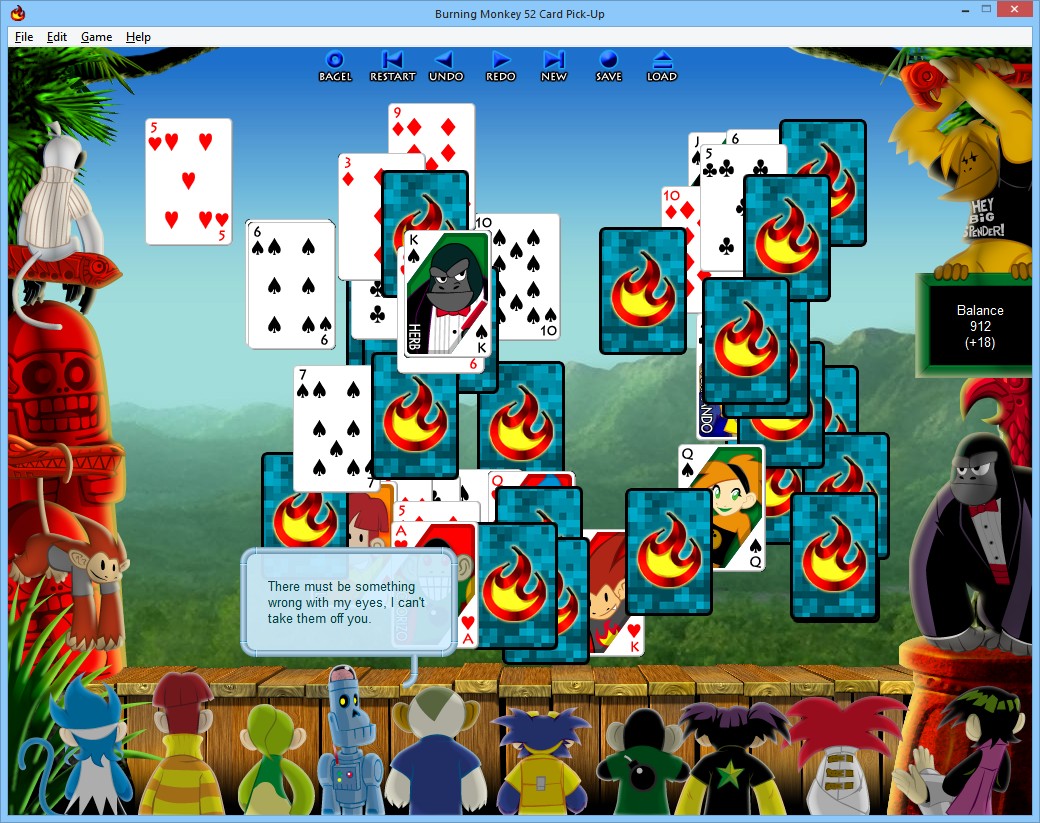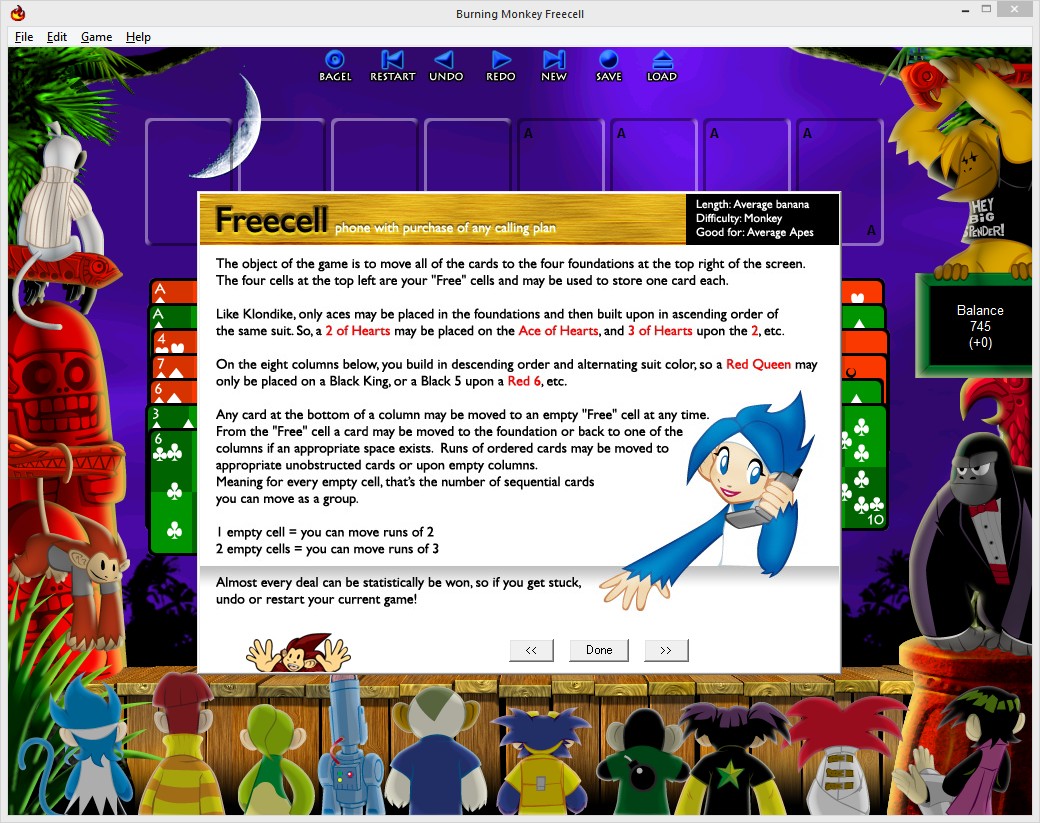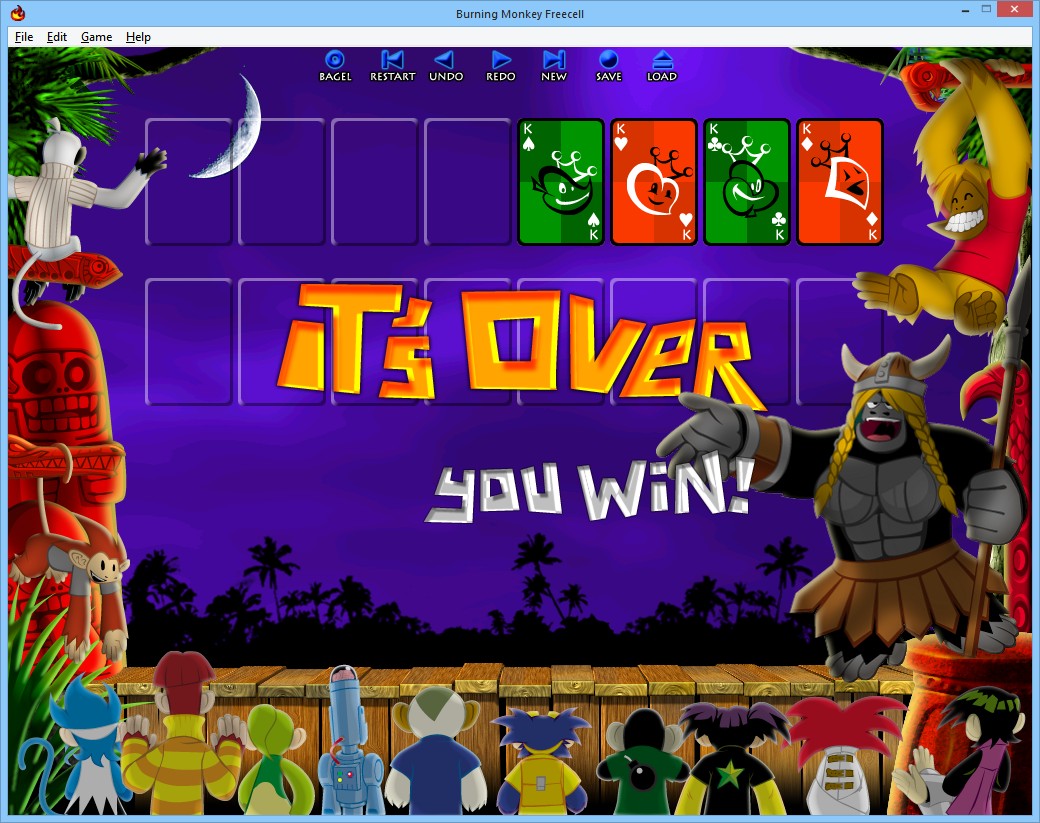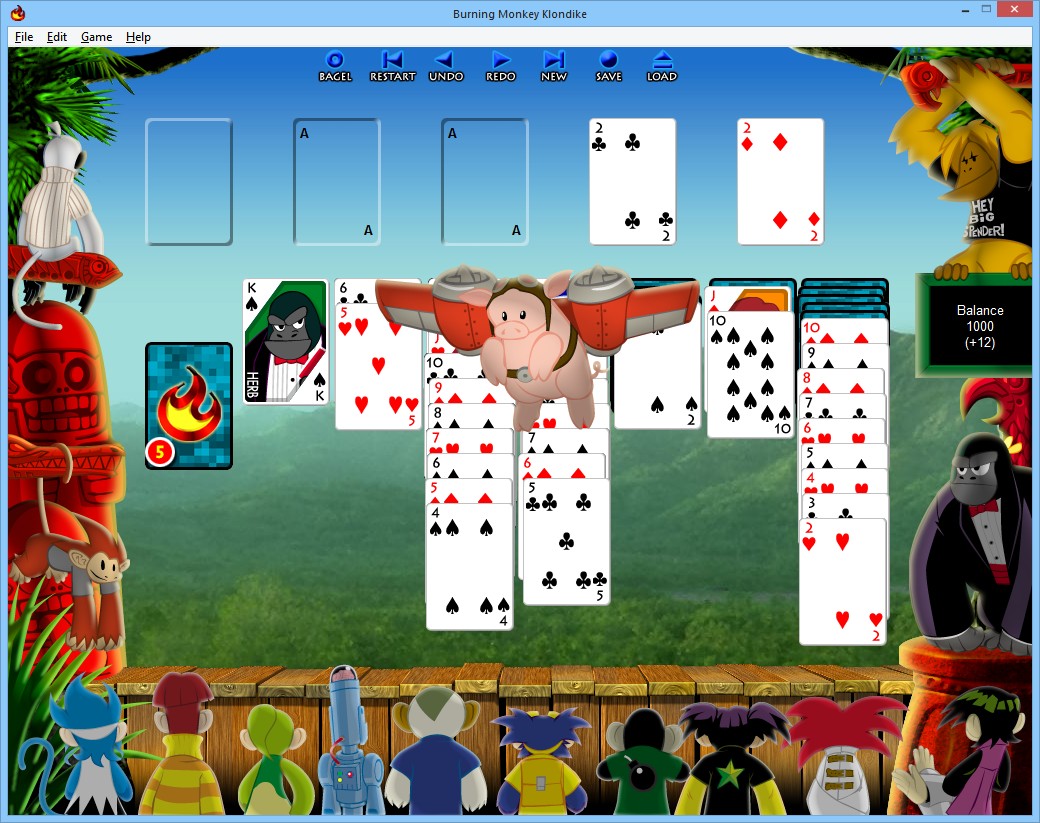
To some, the game of Solitaire is not so much a "game" as it is a "software toy." It's not designed for obsessive and dedicated play (well, so much for this blog, huh?). It's designed to be a momentary distraction from the doldrums of the day. In fact, the "software toy" is, itself, an entire genre of computer application. Back in the day, you had programs that did things like pretend to "drain" your floppy drive, give you a "free cup holder," or sing badly on command. Not really games, but momentary distractions. It'd make plenty of sense that someone that makes a "butcher of song" would then make a solitaire game.......right? I don't know. I'm kind of stretching as it is.
Freeverse Software, a reputable developer of software toys for the Macintosh (such as the above Jared: The Butcher of Song), released the original Burning Monkey Solitaire in...I would assume sometime in the late 1990s; I don't have a lot of data on its history. What essentially acts as a regular game of Klondike, except instead of playing on a game table (simulated or otherwise), you are playing on a movie screen. Because, apparently, monkeys love watching games of solitaire so much that they go to the theater to enjoy the privilege. This is even detailed, in the original release, in a text file entitled "Monkeys at the Movies (a totally fake history of simians & the cinema)," which goes a very long way to demonstrate the kind of bizarre sense of humor you're going to be seeing in these games. (I've archived the text into a pastebin for those curious, since the game seems to no longer be available.)
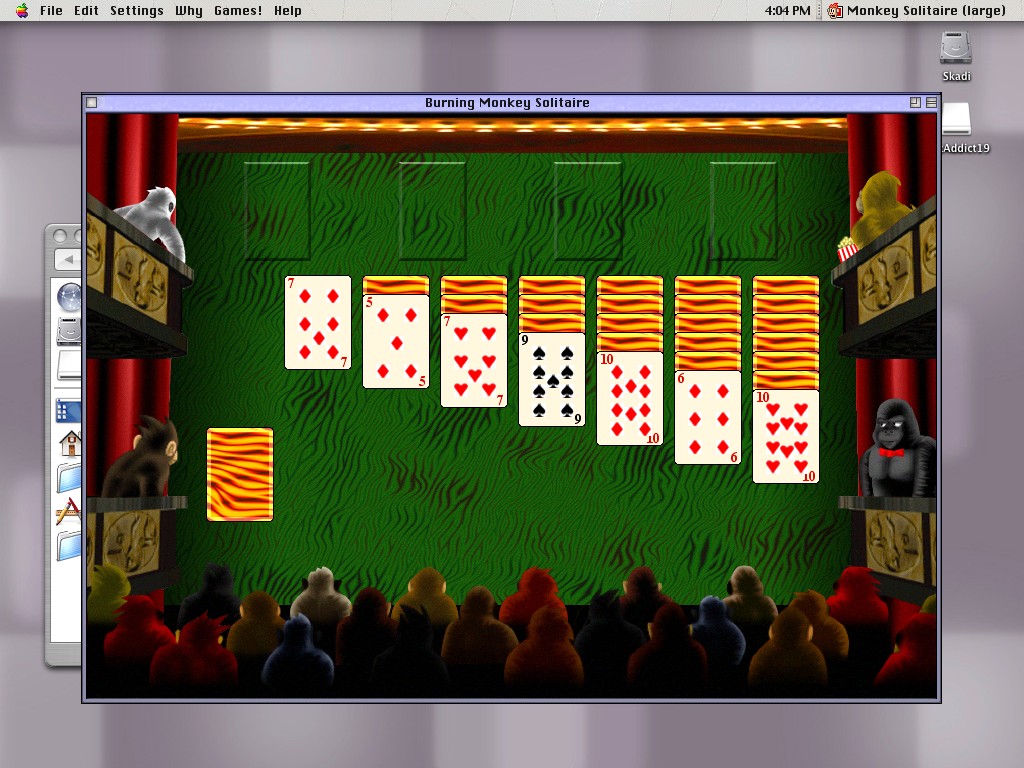
Burning Monkey Solitaire 1.0 (running via Classic mode in OS X).
On its surface, window dressings aside, Burning Monkey very much plays like an ordinary game of Klondike, permanently stuck to deal-three, and keeping only the most basic statistics. There are just little things here and there to make the experience that much weirder. The monkey audience is not especially polite and will constantly fling insults and bad jokes via word balloons. The face cards will greet each other when stacked together ("Ooh, hello your majesty!"), and someone yells out "Four Aces! YES!" whenever you've got all the aces on the foundation. But it's only when you start clicking around the screen - on things that aren't cards - that Burning Monkey begins to show its true purpose. The monkeys in the box seats all react to being clicked, from lamenting one's inability to find his Jujubes (comically attached to his hindquarters), to complaining about the lack of dancing girls. The gorilla in the right corner breaks into song when clicked, and if clicked again, gets shushed by someone off-screen.
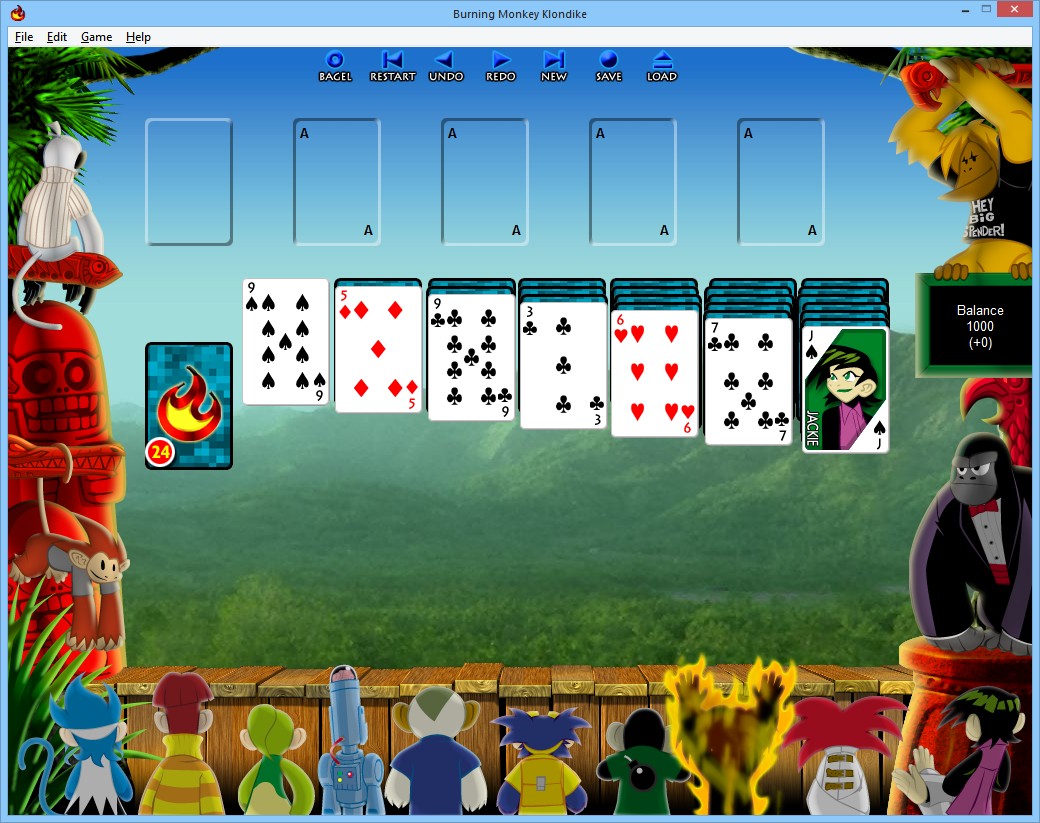
"Ouch. Well, whatever." A member of the audience catches fire in Burning Monkey Solitaire 3.0 for Windows.
But even that doesn't quite explain that title. Why "Burning," you might ask? Well, there is a helpful menu option on the top of the screen, conveniently located right next to the Help menu, that asks this very same question. When "Why Burning?!" is selected, a flaming arrow gets fired at the singing gorilla, who promptly bursts into flames (and is somehow extinguished after a few seconds, none the worse for wear). In later editions, the flaming arrow randomly targets any monkey on screen, sometimes even missing entirely (with an audible "D'oh!" from off-screen), and the fires are now put out by one of three swimsuit-clad monkeys with fire extinguishers. It even gets a keyboard shortcut in later versions, such is the importance of answering that burning question. (Cough.)
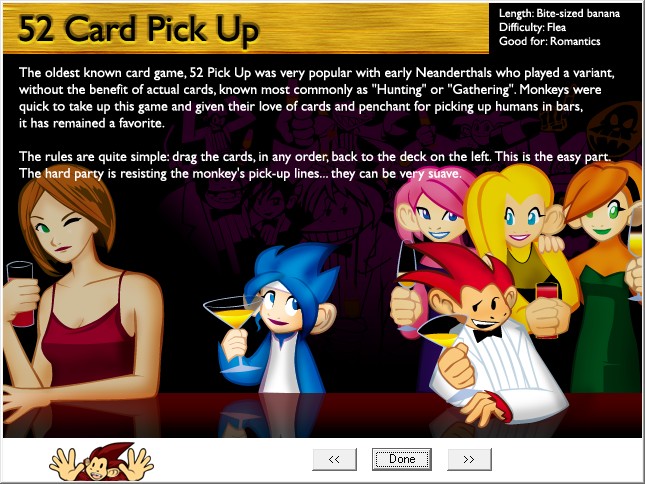
Later releases of Burning Monkey add several solitaire games to choose from. I think this is the only game in existence to properly simulate 52 Pickup.
Freeverse were evidently aware of how much of a cult hit Burning Monkey had become, as their later shareware releases began to focus primarily on spin-offs and sequels, such as the Tetris-like Burning Monkey Puzzle Lab. Burning Monkey Solitaire 2 and 3 - now available with Windows versions, after the first game's Mac exclusivity - both spruced up the art style, added more games, and - most importantly? - added yet more silly Easter eggs. Now every monkey has multiple reactions to being clicked, and there are random bits of the screen that trigger short animations (or an elaborate dance number, finally fulfilling Sebastian's desire for dancing girls). Pigs fly, bombs explode, lasers are fired in random directions, and Freeverse's mascot shows up and waves. Even the regular game functions have silly jokes embedded in them, from the Boss Key that mimics database software, to the inexplicable "Bagel" button on the toolbar. And, rather than including a typical "About" screen in the Help menu, BMS3's About screen instead lists the Top Ten Monkey Films of All Time...out of order, and containing more than ten films.
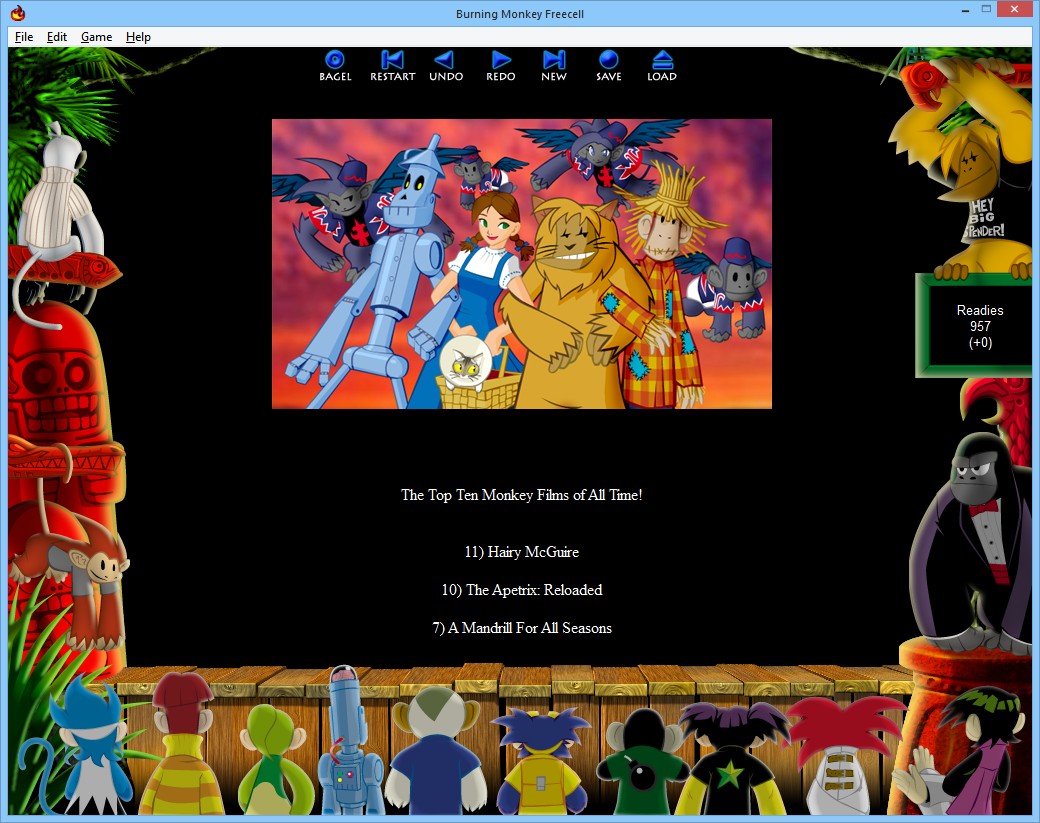
Nobody ever said monkeys were good at math. Or counting.
This series even lasted long enough, apparently, to have a fourth entry that I'm presently unable to locate. But I can only imagine it'll be as off-the-wall as this one. And even beyond the wacky, crazy hijinks, newer versions of BMS include much improved score-keeping (including Vegas-style scoring and online stats tracking), very smooth card handling, and all the comforts expected of a solitaire game that you have to pay money for.
Unfortunately, it must be said that Freeverse Software are effectively no more. While there was at some point an iPad version of Burning Monkey Solitaire, Freeverse were bought up by one of their iOS-market competitors only a few years ago. All their products on the App Store were delisted, and there do not appear to be any equivalents uploaded in their place. But honestly, would anybody else be able to deliver a product so ridiculous, and yet so legitimately fun?
Other images
